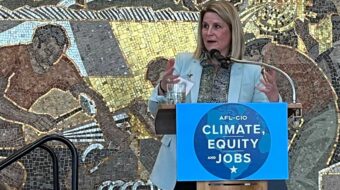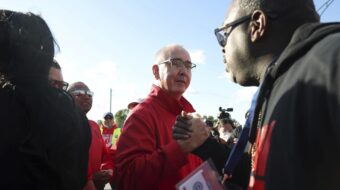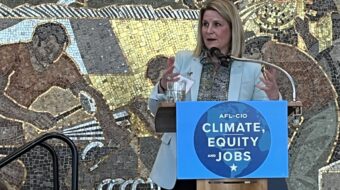WASHINGTON – Ruling Republicans on the politically polarized House Education and the Workforce Committee veered May 26 between criticizing unions’ corporate campaigns and bashing the top enforcement official of the National Labor Relations Board for saying Boeing broke labor law by moving an airplane assembly line to South Carolina in retaliation for past problems with the Machinists.
The panel, one of the most contentious on Capitol Hill, originally called the hearing to let anti-union interests, including a representative from the Associated Builders and Contractors, scream about unions’ corporate campaigns. But it switched back and forth between that and the NLRB complaint against Boeing.
Unions increasingly use corporate campaigns to shine light on employers’ workplace abuses, alert the wider community to them, and to push for company neutrality agreements during organizing drives, thus lessening the corporate virulence and law-breaking unionists encounter in run-ups to NLRB-run elections.
The GOP and the corporate witnesses, including management-side lawyer Jonathan Fritts of Morgan Lewis, decried the corporate campaigns and their public focus on employers. They particularly criticized the Service Employees and the Carpenters. One witness, from Indiana, even claimed he wrote a book on the topic.
The GOP-run committee did not invite any union or NLRB witnesses. The only witness it permitted the minority Democrats was UC-Irvine law professor Catherine Fisk, author of several definitive books on labor law and corporate campaigning. She gave a spirited defense of both the corporate campaigns and unions’ rights under the 1st amendment to the U.S. Constitution and its free speech guarantees.
The constitutional guarantees also figured in the squabble about Boeing.
In early May, NLRB Acting General Counsel Lafe Solomon said he would bring charges against the airplane maker for breaking labor law by establishing an assembly line for its 787 Dreamliner passenger plane in anti-union South Carolina, strictly because of past conflicts with the Machinists in the Pacific Northwest.
Solomon cited public statements by company officials, from the CEO on down, saying the Dreamliner production would be in North Charleston, S.C., not Everett, Wash., or – for parts – Portland, Ore., because of past strikes by Machinists District 751. Federal labor law protects workers’ right to speech and self-help, including strikes.
That’s illegal retaliation against workers exercising their labor law rights, Solomon said. An NLRB administrative law judge will hear the case on June 14.
Since Solomon’s announcement, the GOP has jumped on the NLRB and the stampede continued at the May 26 hearing. The committee’s GOP majority demanded that Solomon turn over all internal work products – memos, discussions of labor law, etc. – between his office, the NLRB’s Seattle district and the parties in the case.
Even the pro-management lawyer, Fritts, told lawmakers that such a massive demand for privileged lawyer-client documents is not right in almost all cases.
Southerners – all Republicans – on the committee defended Boeing’s construction of the assembly line in the right-to-work state of South Carolina as a business decision. They also claimed the Machinists waived the right to bargain over location of the assembly line.
“It’s common for collective bargaining agreements to give an employer the right to make business decisions,” Fisk replied. “But it cannot waive employees’ Section 7 rights” under labor law to collectively bargain, to strike and to free speech, she said. Retaliation for striking, and for free speech, is at the heart of Solomon’s charges.
The Machinists were not invited to testify, either. But the union distributed a statement by union General Counsel Chris Corson noting that when Boeing was charged with labor law breaking, “Boeing hit a new low when it responded by attacking the agency that is enforcing the law,” the NLRB.
“Boeing is not above the law when it comes to the right of workers to collectively bargain. Yet since the complaint, Boeing has attacked the NLRB not on the real facts, but with a political and media barrage in an attempt to deflect” criticism, Corson said.
Pro-union Democrats said the demand for all of NLRB’s work products in the Boeing case chills free speech and unduly interferes in a judicial proceeding. “The question is whether or not the rule of law can prevail when it comes to the insistence of corporate interests to have their way – regardless of what the law actually is,” said Rep. Dennis Kucinich, D-Ohio. “Boeing located its new plant in South Carolina because the Machinists had gone on strike. What Boeing overlooked is that that’s retaliation.”
Fritts also admitted “the ultimate issue is whether Boeing made this decision” to build the Dreamliner in South Carolina “because of that” conflict with the International Association of Machinists and Aerospace Workers. And IAM’s Corson also took a shot at the GOP’s demands for all the NLRB’s work documents. “Political intervention in law enforcement is inappropriate. Boeing should not be allowed to operate by rules of their own, at the expense of the rule of law and the American worker,” his statement concluded.












Comments